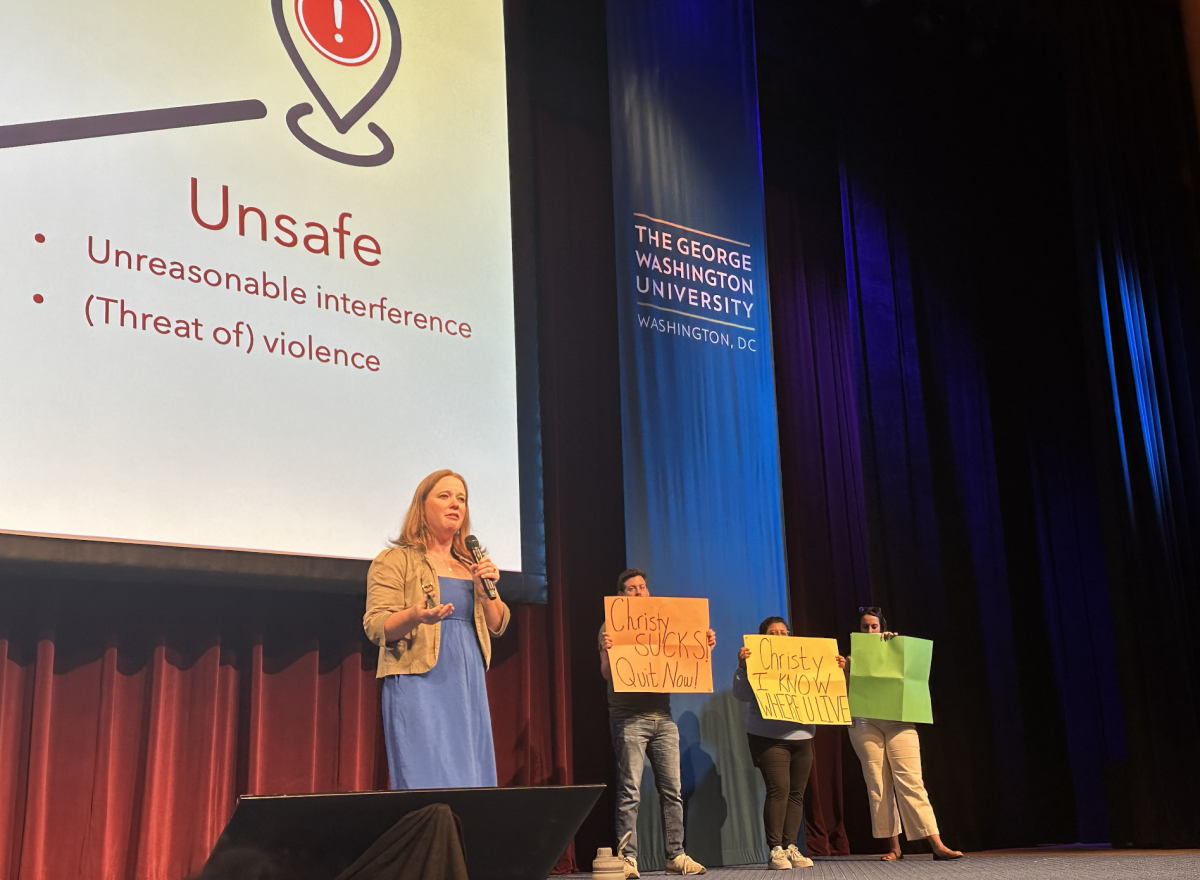Director of Conflict Education and Student Accountability Christy Anthony shared limits to free speech on campus and advice for navigating protests at a first-year orientation event Wednesday.
Anthony’s “You Can’t Say that at GW… or Can You?” presentation tackled Code of Student Conduct violations, hate speech and free expression through mock protests and audience polls in the Lisner Auditorium. Anthony said while GW as a private institution is not required to uphold First Amendment free speech protections, University officials prioritize granting students the right to express their thoughts and ideas on campus.
“GW’s commitment isn’t dependent upon the First Amendment of the U.S. Constitution,” Anthony said. “This is actually a choice we have made as a university, because we believe that if you are going to come here and learn with us, then there needs to be a really robust and free exchange of ideas.”
Anthony had staff pose as protesters during her presentation in the auditorium to show what forms of free speech University officials permit and don’t tolerate on campus.
The orientation event follows months of statements and facilitated conversations from officials about free speech following Hamas’ Oct. 7 attack on Israel and the subsequent war in Gaza. In January, the University unveiled a plan to review free speech policies and strengthen community engagement, which included updated safety policies, fencing rules and faculty working groups.
Anthony declined to comment on how protests, demonstrations and discourse on campus last year influenced her presentation.
Anthony asked students to use the flashlight feature on their phones to indicate whether they agree or disagree with statements about free speech. Almost all students shone their light in agreement that “GW should place some limits on free speech.”
Anthony distinguished between speech that is restricted regardless of content and speech that is restricted based on content. Content-neutral restrictions involve the time, place and manner of the speech, she said. Anthony gave the example of restricting speech for quiet hours in Kogan Plaza during finals week.
To demonstrate different kinds of restricted speech, Anthony pointed to staff members at the back of the auditorium who had their backs to the stage. Anthony said these staff members represented protesters, and since they were not disrupting the event, this kind of demonstration would be allowed. She then had the staff move onto the stage holding blank signs. Anthony said this would not be allowed since it is interfering with an event whose organizers reserved the space, regardless of the protest’s content.
“The standing up, turning their backs to me, I’m going to allow our protesters to do that, and the University allows our protesters to do that, because the fundamental nature of this event can still continue,” Anthony said.
To demonstrate speech restricted due to its content, staff members then held up signs that read “Christy SUCKS. Quit Now,” and “Christy, I know where you live.” Anthony asked students to shine their flashlights to indicate if they believed those signs should be allowed. Most students said the first sign should be, and the second should not. Anthony said this consensus aligns with University policy.
“People have a right to challenge me and my ideas, in part because of my role at the University as a staff member, but also because part of free speech is challenging ideas,” Anthony said.
Anthony said the University will tolerate speech that might make people feel uncomfortable, but not threats of violence. Anthony said some discriminatory speech might be tolerated to support a free exchange of ideas on campus, but that context matters and whether this kind of speech is allowed may depend on how targeted the hate speech is.
“Now, if David, who’s holding the poster, follows me around all day, chanting it at me so that I can’t get my work done, that’s probably going to be a violation,” Anthony said. “And it’s part of the reason to know how much the context matters.”
Anthony said while some harmful speech may be allowed at the University, students must ask themselves if they should say certain things just because they can. She encouraged students to report hateful speech even if they are not sure if it violates University policy.
“We have a shared responsibility for the well being of others, and so as you have these rights of speech and expression, I want you to think about how your speech and expression impacts others,” Anthony said.
Near the end of the event, Anthony recommended that when students encounter speech that makes them feel uncomfortable, they should breathe, ask clarifying questions, give the person the benefit of the doubt and ask about why the person feels the way they do.
“I hope that you will check in with people who experience harmful speech, including if that’s yourself,” Anthony said. “I hope that you, in that air for others, will offer support and care to those affected.”





